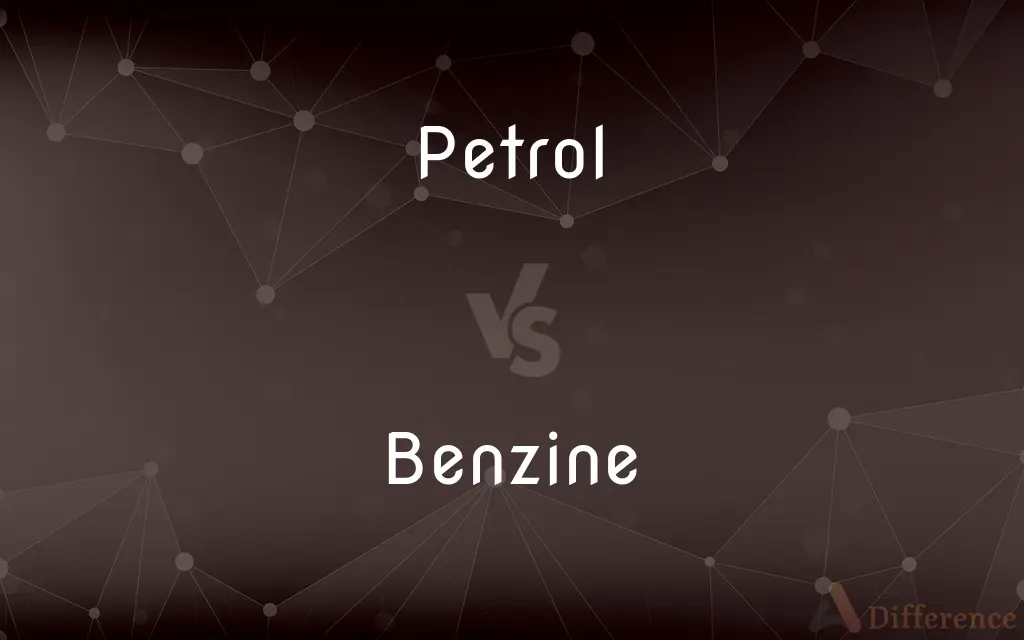Petrol vs. Benzine — What's the Difference?
By Fiza Rafique & Maham Liaqat — Updated on March 9, 2024
Petrol, used as a fuel in internal combustion engines, is synonymous with gasoline, while benzine, a lighter petroleum distillate, is used as a solvent and in chemical synthesis.

Difference Between Petrol and Benzine
Table of Contents
ADVERTISEMENT
Key Differences
Petrol, also known as gasoline in some regions, is a complex mixture of hydrocarbons refined from crude oil, used primarily as fuel in internal combustion engines. It's characterized by its ability to ignite and burn efficiently, powering vehicles, generators, and various types of machinery. Benzine, on the other hand, refers to a specific chemical compound or a mixture of compounds, including lighter hydrocarbons like hexane, used mainly as a solvent in industries and laboratories, and less commonly as fuel.
The composition of petrol includes a blend of paraffins, naphthenes, aromatics, and olefins, optimized to enhance engine performance, fuel economy, and reduce emissions. Benzine's composition is narrower, often focused on single or a small group of hydrocarbons, making it highly effective for dissolving oils, fats, and various chemicals, but less suitable as a general fuel due to its volatility and safety concerns.
Petrol's usage is widespread across the globe, powering the vast majority of road vehicles, from cars to motorcycles and buses. It's a critical component of the transportation sector, with refineries designed to produce it in large quantities. Benzine, while also produced from petroleum, sees its primary application in industrial and chemical processes, including as a solvent for paints, rubber, and adhesives, and in chemical synthesis, where its properties are exploited to extract or process materials.
Safety and environmental concerns differ between petrol and benzine. Petrol's volatility and flammability require careful handling and storage, with emissions contributing to air pollution and greenhouse gases. Benzine, particularly in forms like benzene, poses significant health risks if inhaled or contacted with skin, leading to strict regulations on its use and handling to prevent occupational and environmental exposure.
The economic impact of both substances is significant but in different sectors. Petrol is a major consumer product, affecting daily life and the global economy through its influence on transportation costs and oil demand. Benzine's economic role is more specialized, impacting the chemical, manufacturing, and industrial sectors, where its use as a solvent and in chemical synthesis is critical for producing a wide range of products.
ADVERTISEMENT
Comparison Chart
Composition
Complex blend of hydrocarbons
Lighter hydrocarbons like hexane
Main Use
Fuel in internal combustion engines
Solvent in industries and laboratories
Application
Powers vehicles and machinery
Used in chemical synthesis and as a solvent
Safety Concerns
Flammability and environmental impact
Health risks from inhalation and skin contact
Economic Impact
Major consumer product, affects transportation and oil demand
Impacts chemical, manufacturing, and industrial sectors
Compare with Definitions
Petrol
A refined petroleum product used as fuel in internal combustion engines.
The rising prices of petrol have significantly increased the cost of daily commutes.
Benzine
Often consists of single or a small group of hydrocarbons, like hexane.
The use of benzine in laboratories is prevalent due to its effectiveness as a solvent.
Petrol
Requires careful handling due to its volatility and flammability.
Storing petrol in a closed container can pose a risk of explosion if not ventilated properly.
Benzine
Plays a crucial role in the chemical, manufacturing, and industrial sectors.
The availability of benzine is essential for various industrial processes and production lines.
Petrol
Predominantly used to power vehicles like cars, motorcycles, and buses.
The majority of the world's transportation relies on petrol as a primary fuel source.
Benzine
Poses significant health risks if inhaled or comes into contact with the skin.
Workers handling benzine are required to use protective gear to avoid exposure.
Petrol
Affects the global economy through its influence on transportation costs and oil demand.
Fluctuations in petrol prices can have a direct impact on the cost of goods and services.
Benzine
A lighter petroleum distillate used as a solvent and in chemical synthesis.
Benzine is commonly used in the chemical industry to clean machinery and dissolve certain substances.
Petrol
Includes a blend of paraffins, naphthenes, aromatics, and olefins.
Modern petrol is formulated with additives to improve engine performance and reduce emissions.
Benzine
Mainly applied as a solvent in industries and less commonly as fuel.
Benzine is critical in the manufacturing of paints, rubber, and adhesives.
Petrol
A light fuel oil that is obtained by distilling petroleum and used in internal combustion engines.
Petrol fumes
Benzine
See naphtha.
Petrol
A shade of greenish or greyish blue.
Benzine
Benzene
Petrol
Gasoline.
Benzine
Any flammable petroleum distillate used as a solvent or fuel
Petrol
Petroleum, a fluid consisting of a mixture of refined petroleum hydrocarbons, primarily consisting of octane, commonly used as a motor fuel.
Benzine
A liquid consisting mainly of the lighter and more volatile hydrocarbons of petroleum or kerosene oil, used as a solvent and for cleansing soiled fabrics; - called also petroleum spirit, petroleum benzine. Varieties or similar products are gasoline, naphtha, rhigolene, ligroin, etc.
Petrol
(informal) A motor vehicle powered by petrol (as opposed to diesel).
Benzine
Same as Benzene.
Petrol
Petroleum.
Benzine
A colorless liquid hydrocarbon; highly inflammable; carcinogenic; the simplest of the aromatic compounds
Petrol
A volatile flammable mixture of hydrocarbons (hexane and heptane and octane etc.) derived from petroleum; used mainly as a fuel in internal-combustion engines
Common Curiosities
How do safety concerns differ between petrol and benzine?
Both have safety risks, but petrol's concerns are more about flammability and environmental impact, while benzine's are about health risks from exposure.
Can benzine be used as fuel like petrol?
While benzine can technically be used as fuel, its primary application is as a solvent due to safety and volatility concerns.
What is the primary difference between petrol and benzine?
Petrol is a fuel used in vehicles, while benzine is a solvent used in industrial processes.
Are petrol and benzine derived from the same source?
Yes, both are petroleum distillates, but they are refined and processed differently to suit their specific uses.
What are the economic implications of fluctuations in petrol prices compared to benzine?
Petrol price fluctuations have a broad impact on transportation and the global economy, while benzine's price affects the chemical and manufacturing sectors.
Can the use of petrol and benzine be interchanged in some applications?
Due to their different properties and safety concerns, petrol and benzine are not typically interchangeable in their primary applications.
Why is petrol more commonly known than benzine?
Petrol's widespread use as a vehicle fuel makes it more familiar to the general public, whereas benzine is more specialized in industrial and laboratory settings.
How do regulations affect the use of petrol and benzine?
Both substances are regulated, but benzine (especially forms like benzene) faces stricter controls due to its health risks.
Is the environmental impact of petrol greater than that of benzine?
Petrol has a more direct impact on air pollution and greenhouse gas emissions due to its widespread use as fuel, while benzine's impact is more localized to industrial exposure and spills.
Why is benzine essential in industrial processes?
Its properties as a solvent make it indispensable for dissolving substances and cleaning in chemical synthesis and manufacturing processes.
Share Your Discovery

Previous Comparison
Believe vs. Belief
Next Comparison
Chapter vs. UnitAuthor Spotlight
Written by
Fiza RafiqueFiza Rafique is a skilled content writer at AskDifference.com, where she meticulously refines and enhances written pieces. Drawing from her vast editorial expertise, Fiza ensures clarity, accuracy, and precision in every article. Passionate about language, she continually seeks to elevate the quality of content for readers worldwide.
Co-written by
Maham Liaqat















































